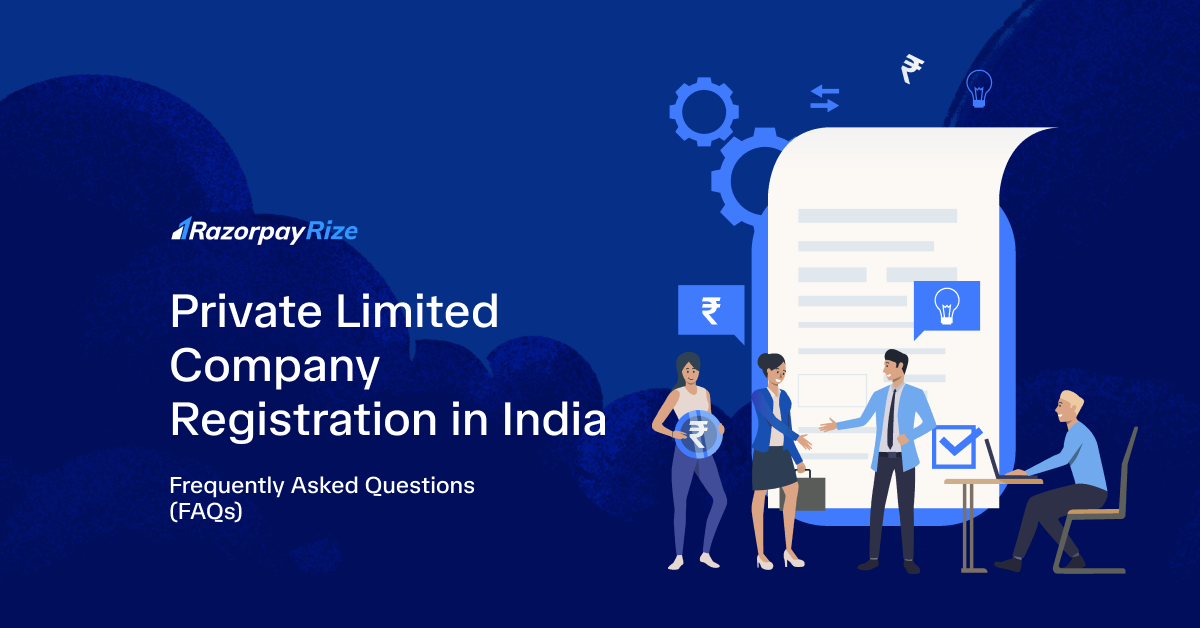Registering a Pvt. Ltd. Company is the most popular and scalable way to start a business in India. It offers limited liability, credibility, and makes you 'investor-ready.' To help you get started, we've compiled the ultimate guide of frequently asked questions (FAQs) about the entire registration process and beyond.
Table of Contents
Section 1: FAQs on The Basics of a Private Limited Company
Start here. These foundational FAQs cover the basics of what a Private Limited Company is, its key benefits, and how it compares to other business structures.
1. What is a Private Limited Company?
A Private Limited Company (Pvt Ltd) is a business structure under the Companies Act, 2013, where ownership is divided among shareholders, and liability of members is limited to their shareholding. It is a separate legal entity from its owners.
2. What are the benefits of registering a Private Limited Company?
- Limited liability protection for shareholders.
- Separate legal entity, distinct from owners.
- Ease of raising capital through equity or debt.
- Perpetual succession, ensuring the company continues even if shareholders change.
- Better credibility with banks, investors, and partners.
Related Read: Characteristics of Private Limited Company
3. What is the difference between a Private Limited Company and a Public Limited Company?
- A Private Limited Company (Pvt Ltd) restricts the transfer of its shares, whereas a Public Limited Company (Public Ltd) can offer its shares to the general public.
- A Private Ltd can have a maximum of 200 shareholders, while a Public Ltd has no upper limit on the number of shareholders.
- Private limited companies are easier to manage and face fewer compliance requirements than Public limited companies, which have stricter regulatory obligations.
Related Read: Private Company Vs Public Company: Key Differences
4. Can a Private Limited Company be started with one person?
No, a Private Ltd requires at least two members/shareholders. For a single person, registering as One Person Company (OPC) is the alternative.
Related Read: Private Limited Company Vs. One Person Company (OPC)
5. Can a Private Limited Company operate as a non-profit?
No, Pvt Ltd companies are for-profit entities. Non-profit organisations should register as Section 8 Companies under the Companies Act, 2013.
Section 2: Registration Requirements & Key Terms
Got questions about eligibility? This section answers the most frequently asked questions about the requirements for directors, shareholders, capital, and documents for your Pvt Ltd registration.
6. Who can register a Private Limited Company in India?
- Minimum 2 and maximum 200 members.
- Must have at least 2 directors, with a maximum of 15.
- Directors and shareholders can be resident Indians or foreign nationals, subject to compliance.
7. How many directors and shareholders are required?
- Minimum 2 directors and 2 shareholders.
- Maximum 15 directors (can be increased through approval).
- Directors and shareholders can be the same person(s).
Related Read: Director in a Private Limited Company
8. Can a Private Ltd company have only one director?
No, a Private Limited Company must have at least 2 directors. An OPC is the alternative to single ownership.
9. Can a foreigner become a director or shareholder?
Yes, but they must comply with Foreign Direct Investment (FDI) regulations and obtain DIN. At least one director must be a resident Indian.
10. Can a Private Limited Company be owned entirely by NRIs or foreign nationals?
A Pvt Ltd company can have foreign shareholders, but at least one director must be a resident Indian. Depending on the sector, FDI regulations must be followed.
11. What is the minimum capital requirement?
There is no minimum paid-up capital requirement to register a Private Ltd company in India.
12. What documents are required for registration?
- PAN and Aadhaar of directors and shareholders
- Passport-size photographs of directors
- Identity and address proof of directors and shareholders
- Proof of registered office (electricity bill/rent agreement)
- NOC from the owner of premises (if rented)
13. Can a Private Limited Company operate without a registered office?
No, a Private Ltd company must have a registered office in India for official communication and MCA filings.
14. What are the MOA (Memorandum of Association) and AOA (Articles of Association)?
The MOA and AOA are the two constitutional documents of your company. The MOA defines the company's objectives and scope of business. The AOA outlines the internal rules and regulations for managing the company, such as director's powers, shareholder meetings, and share transfer rules.
15. What is a DSC and DIN, and why are they needed?
- DSC (Digital Signature Certificate) is the electronic equivalent of your physical signature, required to sign all online forms with the MCA.
- DIN (Director Identification Number) is a unique ID number assigned to every director. You cannot be appointed as a director in any company without a DIN.
Section 3: FAQs on The Registration Process of Pvt. Ltd. Company
Ready to register? These FAQs for Pvt. Ltd. Company registration walks you through the step-by-step process, from timelines to the total expected cost.
16. What is the process for Private Limited Company registration?
The process generally includes:
- Obtain a Digital Signature Certificate (DSC) for proposed directors.
- Get the company name approved via the SPICe+ Part A form.
- Draft Memorandum of Association (MOA) and Articles of Association (AOA).
- File incorporation application SPICe+ Part B with the Ministry of Corporate Affairs (MCA).
- Receive Certificate of Incorporation from MCA.
- Open a bank account.
17. How long does it take to register a Private Limited Company?
Typically, registration takes 7–15 working days, depending on MCA processing and the accuracy of documents.
18. What is the cost of registering a Private Limited Company?
Costs include government fees and professional fees, generally ranging from ₹8,000 to ₹20,000, depending on authorised capital, state stamp duty, etc.
Section 4: Post-Registration: Compliance & Tax
Your company is registered, what's next? Find answers to common questions about mandatory annual compliance, tax filings, and GST requirements for your Pvt Ltd.
19. What is the 'Commencement of Business' (Form INC-20A)?
This is the very first compliance you must complete after incorporation (within 180 days). It's a declaration that the initial shareholders have paid their subscription money. You cannot legally start any business operations or take loans until this form is filed.
20. What are the annual compliance requirements?
A Pvt Ltd company must:
- File Annual Return (Form MGT-7)
- File Financial Statements (Form AOC-4)
- Conduct statutory audits if turnover exceeds ₹2 crore or paid-up capital exceeds ₹50 lakh
- File Income Tax Returns
21. How is a Private Limited Company taxed?
A Private Ltd company is taxed as a separate entity under the Income Tax Act, 1961. Corporate tax rates apply depending on turnover and turnover-based exemptions. Based on AY 2025-26 Tax rates, excluding surcharge and cess:
- For turnover less than 400 Crores: A 30% tax rate
- For turnover more than 400 Crores: A 25% tax rate
22. Is GST registration mandatory for a Pvt Ltd company?
GST registration is required only if turnover exceeds threshold limits (₹40 lakh for goods, ₹20 lakh for services) or if operating in sectors mandating GST.
23. Can a Private Limited Company get tax exemptions?
Yes, a Private Ltd company may be eligible for certain tax exemptions and incentives, depending on the sector, startup status, or government schemes.
Section 5: Funding, Shares & Capital
These frequently asked questions cover how a Private Limited Company can raise money, issue shares (like ESOPs), and manage its capital structure.
24. Can a Private Ltd company issue shares to the public?
No, a Private Limited Company cannot issue shares to the public; it can raise funds privately through investors.
25. Can a Private Ltd company issue preference shares or debentures?
Yes, a private limited company can issue preference shares, debentures, or raise funds privately from investors, but it cannot be listed on the stock exchange.
26. Can a Private Limited Company provide ESOPs (Employee Stock Options)?
Yes, Pvt Ltd companies can issue ESOPs to employees as a way to attract talent and retain staff, subject to Articles of Association provisions.
Section 6: Operations, Changes & Winding Up
A business is always evolving. This section provides answers to FAQs about making changes to your company, from changing your address to conversions and dissolution.
27. Can a Private Ltd company change its registered office address?
Yes, a private Ltd company can relocate its registered office within the same state or to a different state by filing Form INC-22 with the MCA.
28. Can a Private Limited Company be registered in multiple states?
The company is incorporated in one state but can operate in multiple states. It may require GST registration or local trade licenses in each state of operation.
29. Can a Private Ltd company be sold or transferred?
Yes, shares of a Private limited company can be sold or transferred, but the Articles of Association may restrict the transfer.
30. Can a Private Ltd company merge with another company?
Yes, a Pvt Ltd company can merge or acquire another company following the Companies Act 2013 and applicable legal procedures.
31. Can a Private Limited Company convert into another type of company?
Yes, it can convert into:
- Public Limited Company, if needed
- Limited Liability Partnership (LLP) through a prescribed process
Related Read: Conversion of Private Limited Company into Public Limited Company
32. Can a Private Limited Company be converted into an OPC?
No, a Pvt Ltd company cannot convert into an OPC, as an OPC is for single-member ownership only.
33. Can a Private Ltd company be dissolved?
Yes, a Private Ltd can be voluntarily or compulsorily dissolved by following MCA procedures, including settling liabilities and filing necessary forms.
Private Limited Company
(Pvt. Ltd.)
- Service-based businesses
- Businesses looking to issue shares
- Businesses seeking investment through equity-based funding
Limited Liability Partnership
(LLP)
- Professional services
- Firms seeking any capital contribution from Partners
- Firms sharing resources with limited liability
One Person Company
(OPC)
- Freelancers, Small-scale businesses
- Businesses looking for minimal compliance
- Businesses looking for single-ownership
Private Limited Company
(Pvt. Ltd.)
- Service-based businesses
- Businesses looking to issue shares
- Businesses seeking investment through equity-based funding
One Person Company
(OPC)
- Freelancers, Small-scale businesses
- Businesses looking for minimal compliance
- Businesses looking for single-ownership
Private Limited Company
(Pvt. Ltd.)
- Service-based businesses
- Businesses looking to issue shares
- Businesses seeking investment through equity-based funding
Limited Liability Partnership
(LLP)
- Professional services
- Firms seeking any capital contribution from Partners
- Firms sharing resources with limited liability
















